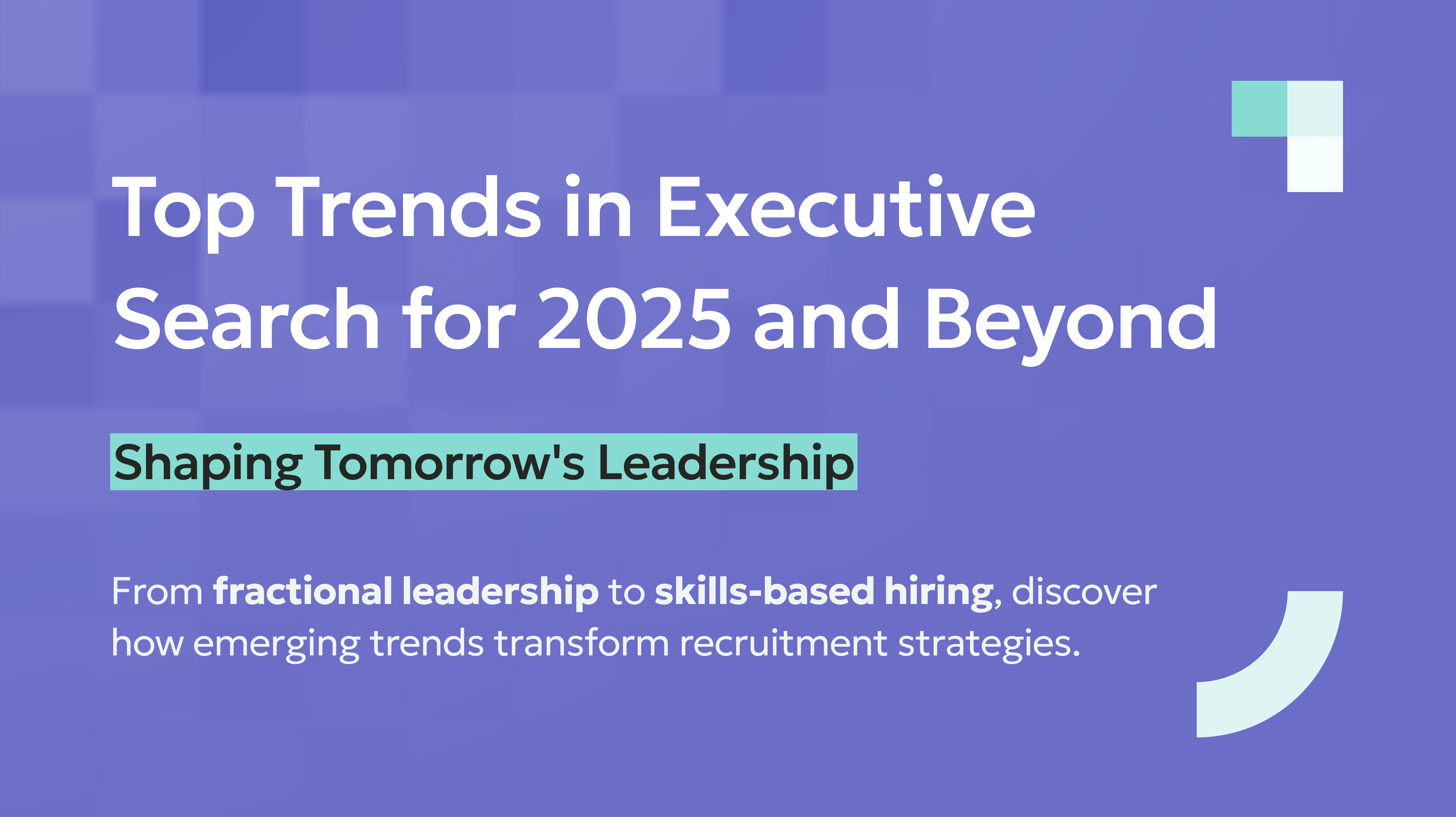Key Takeaways
- A growing trend in Executive Search highlights employers’ focus on leaders who can navigate crises and prepare organizations for the future
- Companies are seeking professionals with key skills in the following areas:
- Operational Stability: Leaders who can strengthen teams and existing structures while safeguarding critical resources.
- Creativity and Resilience: Finding innovative solutions and inspiring perseverance during challenges.
- Diversification and New Markets: A forward-looking vision to develop new sales channels and expand into fresh markets.
- Turnaround Strategies: Experience in repositioning businesses and optimizing resources for long-term success.
Is executive recruitment going through a seismic shift? There are increasing technological advancements, evolving work cultures, and growing complexities of leadership roles. If you work for an organization that wants to stay on top of the game, this article will help you. We will explore the emerging trends shaping executive search and provide actionable insights into this news landscape.
Flexibility in Executive Roles: Fractional and On-Demand Expertise
Understanding fractional leadership
Fractional leadership offers companies access to part-time executives who bring high-level expertise without requiring a full-time commitment.
For growing businesses, this is a game-changer. Whether a startup needs a CFO or a mid-sized company requiring strategic marketing direction, fractional leaders balance flexibility and cost-effectiveness.
Example: Imagine a growing e-commerce company preparing for international expansion. Instead of hiring a full-time Chief Marketing Officer, they bring on a fractional CMO specializing in global market entry strategies. This executive works part-time, delivering expert guidance while keeping costs manageable.
‘’Fractional Management isn’t just a new trend; it’s the future of leadership, where flexibility meets powerhouse expertise. This is where elite professionals step in, light the spark, and leave your business blazing a trail forward.’’
Elena Cramba – Partner, Fractional & Executive Search
The Appeal of on-demand expertise
While fractional leadership addresses ongoing strategic needs, on-demand expertise caters to companies facing immediate or short-term challenges. This approach is ideal for businesses that require specialized leadership for specific projects or during critical periods, like launching a new product, managing a crisis, or navigating organizational change.
Unlike fractional leaders, who often become integrated into a company’s longer-term strategy, on-demand executives tackle a defined problem or lead a high-stakes initiative. Once the project concludes, they move on, leaving the organization with a clearer path forward.
Strategies for integrating flexible leaders
If your eyes are sparkling reading all the advantages of fractional and on-demand executives, there are a couple of things you should consider to maximize their impact:
- Set clear goals: Define specific objectives and measurable outcomes to guide their contributions from day one.
- Streamline onboarding: Provide essential resources, such as company overviews, project roadmaps, and key contacts, to help them hit the ground running.
- Ensure strong communication: Schedule regular check-ins and establish a point of contact to keep them aligned with organizational goals.
- Integrate quickly: Introduce them to team members and stakeholders early, fostering collaboration and trust.
- Leverage expertise strategically: Assign them to high-priority tasks where their specialized skills can deliver the greatest impact.
- Plan for knowledge transfer: Before your collaboration ends, document their insights and ensure key learnings are shared with the internal team.
The rise of skills-based hiring
Shift from traditional qualifications to practical skills
Another rising trend is the shift from traditional qualifications to practical skills. Gone are the days when HR prioritized advanced degrees or lengthy resumes over hard and soft skills.
Critical skills in demand
What are the skills you should look into? In the last years, 3 main skills are getting more and more attention:
- AI and Data Analytics proficiency: Leaders must understand how to harness data for strategic decisions.
- Digital transformation expertise: Guiding companies through technological overhauls.
- Leadership agility: Adapting quickly to shifting market conditions.
Implementing skills-based assessments
However, we know that assessing these skills isn’t an easy job. Here are five practical tools that you can use:
- Case studies and simulations: Present realistic business scenarios for candidates to solve, revealing their decision-making and critical thinking skills.
- Behavioral interviews: Focus on past experiences to understand how candidates have applied their skills in similar situations.
- Skill-specific tests: Evaluate technical expertise with role-relevant tasks, like creating strategies, analyzing data, or solving real challenges.
- Portfolio reviews: Examine past work to gauge a candidate’s achievements and practical impact in similar roles.
- Problem-solving exercises: Assign role-specific tasks to assess how candidates approach challenges unique to your business.
At GetFrankly, we use multiple tools to better assess the candidate’s skill set and fit with the culture. Some examples are the 5 Why technique, KSAO (Knowledge, Skills, Abilities, and Other Characteristics), and benchmarking.
Leveraging AI and data analytics for strategic recruitment
Another key trend shaping strategic recruitment processes is the use of AI. While many companies have adopted AI for day-to-day administrative tasks, its real potential lies in assisting HR teams with more specialized and strategic activities.
Here’s how AI is making a difference:
- Market mapping and talent discovery
AI is invaluable for market mapping, ensuring every stone is turned in when identifying passive talent. It helps analyze industries, competitors, technologies, and relevant keywords, creating a comprehensive overview of the target talent pool. AI acts as an expert assistant, offering deep insights into the client’s industry and expanding the scope of talent searches. One tool that you can use is LinkedIn Talent Insights. - Simplifying rudimentary tasks
AI-powered tools can handle time-consuming tasks like note-taking during interviews, summarizing discussions, and managing simple yet repetitive administrative activities. This allows HR teams to focus on higher-value strategic initiatives. You can use Otter.ai for transcription and meeting summaries. You might also consider using ChatGPT with the following prompt: “Summarize the key takeaways and action items from this interview.” - Boolean search optimization
AI platforms can generate precise Boolean search strings for sourcing candidates, streamlining the search process and improving efficiency in finding the right fit for technical and niche roles. You can use this prompt: “Create a Boolean search string to find software engineers with experience in AI and cloud technologies located in [region].” - Recruiting chatbots
For IT and technical projects, tools like AI-driven recruiting chatbots can engage with candidates, answer their questions, and gather initial information, providing seamless support to HR teams.
“At GetFrankly, AI helps us quickly identify multiple keywords used to pinpoint the right candidates and analyze resumes efficiently, enabling us to build an interview strategy perfectly aligned with the profile we seek.”
Elena Cramba – Partner, Fractional & Executive Search
Conclusion
Executive search is transforming, driven by trends like fractional leadership, skills-based hiring, and a renewed focus on AI tools. If your company wants to build teams equipped to navigate all these challenges, we recommend adopting these trends into your growth plan.
FAQs: Executive Recruitment Trends
What is fractional leadership, and how does it benefit businesses?
Fractional leadership involves hiring part-time executives for specialized roles. It offers cost-effective expertise and flexibility, especially for startups or growing companies.
Why is skills-based hiring becoming popular in executive search?
Skills-based hiring prioritizes practical expertise over traditional credentials, ensuring executives have the hands-on capabilities to navigate complex challenges and lead effectively.
How does AI improve the executive recruitment process?
AI streamlines candidate screening reduces bias, and predicts leadership success. It helps recruiters focus on high-potential candidates while saving time and resources.
What is the impact of remote and hybrid models on executive roles?
Remote and hybrid work models attract top-tier executive talent by supporting work-life balance. These flexible options are now essential for competitive hiring strategies.







